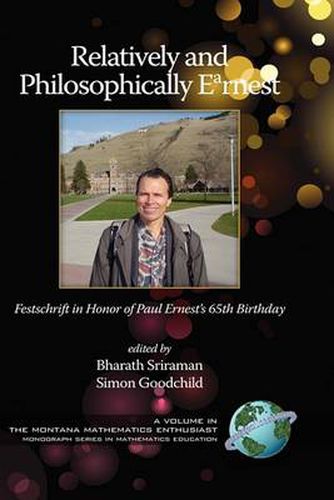Readings Newsletter
Become a Readings Member to make your shopping experience even easier.
Sign in or sign up for free!
You’re not far away from qualifying for FREE standard shipping within Australia
You’ve qualified for FREE standard shipping within Australia
The cart is loading…






This title is printed to order. This book may have been self-published. If so, we cannot guarantee the quality of the content. In the main most books will have gone through the editing process however some may not. We therefore suggest that you be aware of this before ordering this book. If in doubt check either the author or publisher’s details as we are unable to accept any returns unless they are faulty. Please contact us if you have any questions.
Paul Ernest’s name is synonymous with social constructivism as a philosophy of mathematics. His contributions to mathematics education have occurred at a very fundamental level and to an extent shaped theory development in this field. His research addresses fundamental questions about the nature of mathematics and how it relates to teaching, learning and society. For the last three decades Paul has been a prolific scholar who has published in a wide array of topics such as the relationship between the philosophy of mathematics and mathematics education, and more generally the philosophy of mathematics education, ethics and values in mathematics education, and the philosophy of research methodology. The title of this Festschrift is meant to be a pun to convey the sometimes relativistic dimension to mathematical certainty that Paul argued for in developing his philosophy, and also a play on words for the fact that absolute ‘earnestness’ may perhaps be a Platonic construct, and not possible in the realm of language and human discourse! Paul Ernest’s scholarly evolution and life can best be summarized in the words of Walt Whitman ‘Do I contradict myself? Very well then I contradict myself’ (I am large, I contain multitudes). Indeed his presence has been large and multitudinous and this Festschrift celebrates his 65th Birthday with numerous contributions coming from the mathematics, philosophy and mathematics education communities around the world.
$9.00 standard shipping within Australia
FREE standard shipping within Australia for orders over $100.00
Express & International shipping calculated at checkout
This title is printed to order. This book may have been self-published. If so, we cannot guarantee the quality of the content. In the main most books will have gone through the editing process however some may not. We therefore suggest that you be aware of this before ordering this book. If in doubt check either the author or publisher’s details as we are unable to accept any returns unless they are faulty. Please contact us if you have any questions.
Paul Ernest’s name is synonymous with social constructivism as a philosophy of mathematics. His contributions to mathematics education have occurred at a very fundamental level and to an extent shaped theory development in this field. His research addresses fundamental questions about the nature of mathematics and how it relates to teaching, learning and society. For the last three decades Paul has been a prolific scholar who has published in a wide array of topics such as the relationship between the philosophy of mathematics and mathematics education, and more generally the philosophy of mathematics education, ethics and values in mathematics education, and the philosophy of research methodology. The title of this Festschrift is meant to be a pun to convey the sometimes relativistic dimension to mathematical certainty that Paul argued for in developing his philosophy, and also a play on words for the fact that absolute ‘earnestness’ may perhaps be a Platonic construct, and not possible in the realm of language and human discourse! Paul Ernest’s scholarly evolution and life can best be summarized in the words of Walt Whitman ‘Do I contradict myself? Very well then I contradict myself’ (I am large, I contain multitudes). Indeed his presence has been large and multitudinous and this Festschrift celebrates his 65th Birthday with numerous contributions coming from the mathematics, philosophy and mathematics education communities around the world.